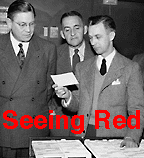

In Washington, the 1946 elections featured some Republicans campaigning against "Communist-controlled Democrats," by which they meant legislators who had supported organizations alleged to be "Communist fronts." The Republicans triumphed, gaining control of both houses of the Legislature. Among those swept into office on the tide of change was Canwell, who claims in his recently-published oral history that he had not sought the office and campaigned little. "I made two statements about what I would do," he told his interviewer. "I wouldn't vote for any new taxes and I'd do something about the Communists."
What he did was to introduce House Concurrent Resolution No. 10, which was modeled on similar legislation in other states. When the resolution passed and committee members were appointed, there were five Republicans and two Democrats. Named chairman, Canwell immediately launched his first assault--on the Washington Pension Union--holding hearings in January of 1948. The UW was his next target.
Canwell knew he had political backing for singling out the University. After the election, conservative Democrats had joined Republicans in a caucus and had produced a report stating, "It is common knowledge in many quarters that the Communists have infiltrated the University of Washington campus and that their supporters have found important places on the faculty."
Canwell himself claims the University "had become not only a local but a national scandal. It was hitting hard at the heart of what the people wanted in education and wanted for their sons and daughters. So, there was constant pressure on legislators to get with it and do something."
But as the committee began its investigation, one of Canwell's Democratic committee members made a tactical error. In a speech in Spokane, Sen. Thomas Bienz claimed there were "probably not less than 150 Communists or Communist sympathizers on the faculty." Knowing this kind of claim could backfire, Canwell quickly announced that the committee was not ready to say exactly how many faculty were Communists.
The publicity, however, made an already nervous campus more so, as Canwell's staff of investigators began knocking on the doors of the UW faculty. Philosophy Professor Melvin Rader later wrote about his experience with them: "It was the middle of May in the year 1948. I was hard at work in my office in Savery Hall. ... There was a knock on my door. When I opened it I recognized two of the investigators of the Committee on Un-American Activities of the state Legislature. ... They talked to me about an hour. `Our information,' they said, `puts you in the center of the Communist conspiracy.' "
Though many on campus resented the investigators' methods, they were advised to cooperate. At an all-campus meeting, President Raymond Allen told the faculty, "We cannot afford to engage in a public fight with the Canwell Committee."
Jane Sanders, '71, '76, who did her doctoral dissertation and later a book (Cold War on the Campus) about the UW during this period, believes Allen felt trapped between "the legislative committee, public opinion and the regents on one hand, and the faculty and the American Association of University Professors on the other." Allen had been unsuccessful in getting the regents to endorse either a tenure bill in the Legislature or the tenure provisions in the Faculty Code. With these failures, he knew he and the faculty served at the pleasure of the regents. Moreover, as a physician and former medical dean, he had been recruited to the UW in 1946 to nurture the fledgling medical school created by legislation the year before. He needed a good relationship with the Legislature to accomplish this. Publicly, Allen stated that he "welcomed" the investigation.
The Hearings: "All Powers Necessary and
Convenient"
The Firings: Three Professors Sacked,
Three Others Put on Probation
The Aftermath: Banned
from Academe
The Apology: "A Dark Day in Our
History" Says UW President
Red Alert: Lectures,
Exhibits and a Play about the Canwell Hearing
Reader Reaction to "Seeing Red": Was It "Superb" Reporting or "Trash"?
Online Primary Sources of the Canwell Committee Hearings